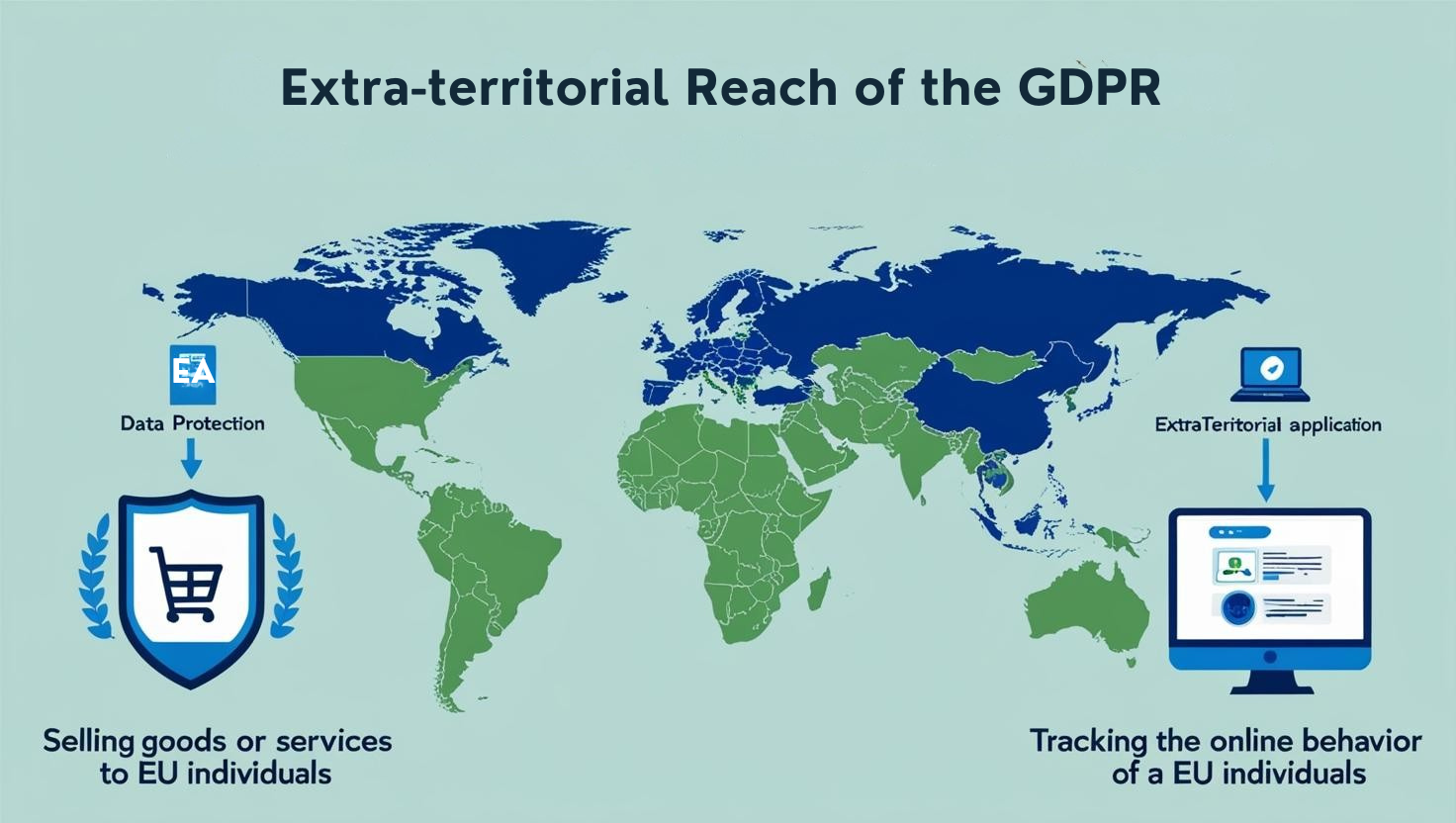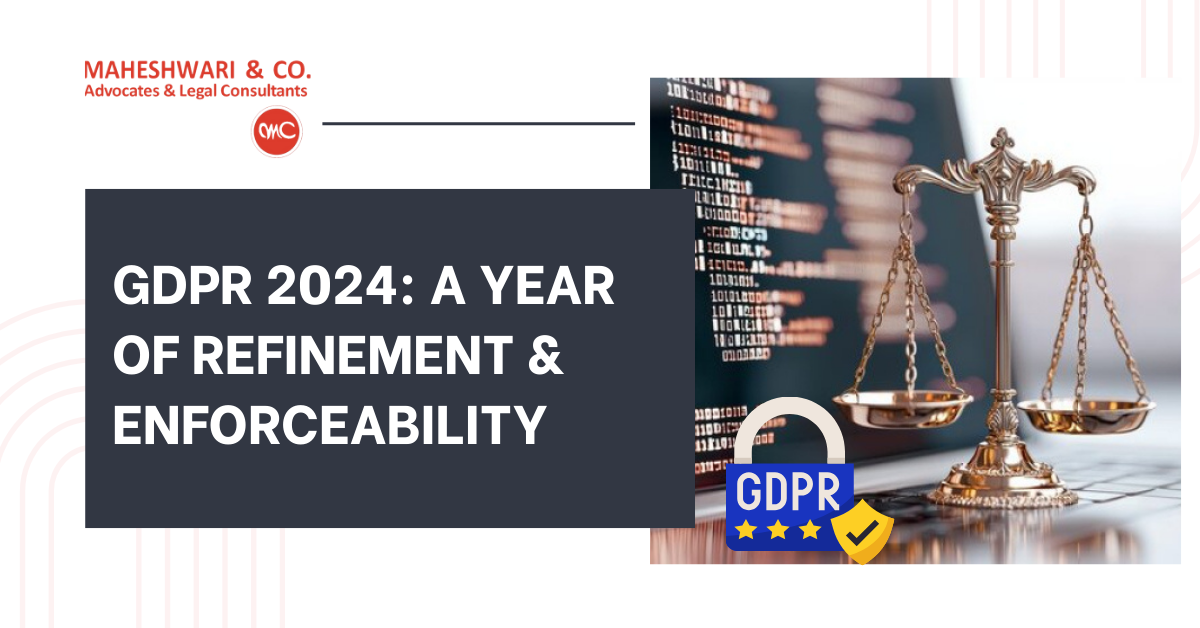INTRODUCTION
General Data Protection Regulation (GDPR), a comprehensive data protection law, was enacted on 25 May 2018 by the European Union. It seeks to streamline laws for global trade and improve people’s access to personal information. Strict requirements for the gathering, processing, and archiving personal data are required under the GDPR, and they apply to all organizations, regardless of location that handle the data of EU citizens. Transparency, data minimization, and the need for express consent are important concepts of GDPR. Due to the harsh consequences of noncompliance, the legislation emphasizes how crucial protecting individual privacy is in the digital era.
The General Data Protection Regulation is an international benchmark for data protection that impacts legislation and corporate processes. The European Union (EU) constantly improves regulations to meet new difficulties as digital environments change. The GDPR saw major modifications, enforcement actions, and judicial decisions in 2024, making it a pivotal year. These modifications reaffirmed the GDPR’s robustness and adaptability to new legal and technological issues.
KEY AMENDMENTS:
- Enhancement of the One-Stop-Shop (OSS) Mechanism
The OSS mechanism, as provided under Article 56 of the GDPR, seeks to streamline the enforcement process for companies that operate across multiple EU member states by nominating a lead supervisory authority that would take care of cross-border complaints. The 2024 amendments made OSS more streamlined by making clear the determination of the lead authority in complex cross-border issues and by enhancing the cooperation between the DPAs (European Commission website). These changes are expected to make compliance easier for multinational corporations and reduce overlap in regulations. However, the increased coordination between authorities may be a challenge for businesses to adapt to the new framework.
- Clarification of Data Transfer Rules
Under the GDPR, cross-border data transfer has been the burning point for control and focus on whether data is transferred from the EU to the countries whose data protection policies vary. The 2024 amendments to the GDPR, however, addressed this by making data transfer clearer by focusing more on mechanisms such as SCCs and BCRs (European Commission). The changes ensure that these transfer mechanisms remain compliant with the GDPR, especially in the wake of international judicial developments, for example, as in the case of the Schrems II judgment (https://www.europarl.europa.eu/RegData/etudes/ATAG/2020/652073/EPRS_ATA(2020)652073_EN.pdf). The effects of these will be an enhanced clarity of operations for businesses outside their borders but must update data processing agreements and contracts to align with the new requirement.
- Strengthened Enforcement Powers
The GDPR already had robust enforcement powers for imposing significant fines on non-conforming organizations. The amendment, passed in 2024, enhances the enforcement power to ensure actions are more decisive and uniform in their application. The new rights allow DPAs to have additional powers to mete out penalty in cases concerning data breaches, infringements of conditions of consent, and inadequate measures for data protection. Companies also face strict reporting deadlines regarding data breaches. This increased level of enforcement further helps to act as a major discouragement from non-compliance since businesses need to be proactive in keeping abreast of all provisions under the GDPR to avoid paying hefty fines.
- Introduction of the e-Privacy Regulation (ePR)
The ePR is said to complement GDPR with regard to addressing privacy and related issues under electronic communications covering topics such as cookies, unsolicited direct marketing messages, and any kind of electronic online tracking activity. The European Parliament adopted stricter rules on use of cookies, tracking, and unsolicited communications, intending the ePR to come into operation by 2024 (European Commission). Here, the burden lies on strict insistence on receiving clear consent by users before undertaking the processing. This regulation further enhances the emphasis of the GDPR on the protection of privacy, especially in the digital economy. Therefore, any organization involved in digital marketing and online communications has to comply with the GDPR and ePR in ensuring that the privacy of the user is protected from any violation or penalty.
- Focus on Artificial Intelligence and Data Protection
With the increasing deployment of artificial intelligence (AI) in businesses, issues surrounding invasion of privacy, biased automated decision-making, and profiling have been rather amplified. This has led to recent moves within the European Union to introduce measures through the 2024 amendments regarding AI systems under the GDPR (EDPB website). With these measures, AI applications will have to respect key data protection principles, especially in respect to consent, transparency, and rights to explanation over automated decisions. Thus, AI integration with data protection law is the one that addresses newly emerging privacy issues with AI. In this scenario, businesses should have additional protective mechanisms to ensure compliance of their AI systems with standards set by the GDPR and user’s rights toward privacy.
- Significant Enforcement Actions under GDPR in 2024
Year 2024 was such a year that saw several high-profile cases that have had an illustrious reputation in sealing the dense data protection standards by way of this regulation. It was not only the enforcement of such high-profile cases but also indicating how amendment and further continuation of recent amendments have boosted more compliance. Significant enforcement actions under GDPR include the Uber Fined €290 Million for Illicit Data Transfers in which the Dutch DPA fined Uber 290 million Euro in 2024 for transferring illegal data from the EU to the United States. This occurred after it failed to ensure adequate measures to provide enough safeguards when moving personal data across borders, primarily because of the invalidated EU. The U.S. Privacy Shield framework due to the Schemers II decision demonstrated the need to respect the new provisions of GDPR regarding international data transfers, such as the use of SCCs and BCRs (European Commission). 2024 GDPR amendments impact enforcement actions. 2024 GDPR amendments enhance the emphasis on compliance through increasing penalties, decision timelines, and DPA cooperation. Uber, LinkedIn, and Clear view AI are cases showing how robustly enforced the regulation is in particular, across border transfers of data, consent, and the processing of biometric data. The effect is that such cases become a strong deterrent and give an indication of more strict application of the EU’s commitment to accountability in this updated GDPR framework.
GDPR AND ITS EXTRATERRITORIAL APPROACH

The GDPR is expansive and comprehensive in scope, making sure that EU residents’ and citizens’ personal data is safeguarded wherever and by whomsoever it is processed. This worldwide applicability, also referred to as the “extra-territorial effect”, makes international organizations comply with GDPR if they process EU personal data under certain conditions. According to Article 3 of the regulation, GDPR applies to organizations within the EU no matter where their activities of processing take place, so that EU data is better protected even in foreign operations.
Most importantly, the GDPR also extends to non-EU organizations in two key situations. First, if they sell goods or services—free or paid—to EU individuals. For instance, an Indian online marketplace showing prices in euros or even showing advertisements specific to EU nations is deemed to be targeting EU customers and has to abide by GDPR. Second, if they track the behaviour of EU individuals, like monitoring website visitors with cookies, tracking user activity with profiling, or analyzing web behaviour, they are under the domain of GDPR.
Although it has widespread use, GDPR makes some exceptions. It does not cover purely personal or domestic activities. In addition, small organizations with fewer than 250 employees are exempt from keeping detailed records of processing activities, though they are still required to comply with basic principles such as transparency and lawful processing.
For companies globally, GDPR is a must if they have their sights on or communicate with EU citizens. Failure to comply can lead to hefty fines—up to €20 million or 4% of worldwide annual turnover, whichever is greater. This transforms GDPR into not only a local regulation but a global standard for data privacy, highlighting transparency, accountability, and the inherent rights of an individual. It has shaped privacy legislation across the world, raising the bar in the way companies manage personal information.
CONCLUSION
The EU’s commitment to improving its data protection system is demonstrated by the GDPR’s advancement in 2024. The regulation monitors the intricacies of the digital age through judicial interpretations, significant enforcement actions, and procedural modifications. These changes highlight the GDPR’s position as a pillar of international data protection and its capacity to tackle new issues.
The GDPR, the world standard for data protection, is still an essential instrument for protecting people’s privacy and building confidence in digital ecosystems. The EU can increase the rule’s efficacy and guarantee that it continues to serve as a global standard for data protection by building on the developments of 2024.





